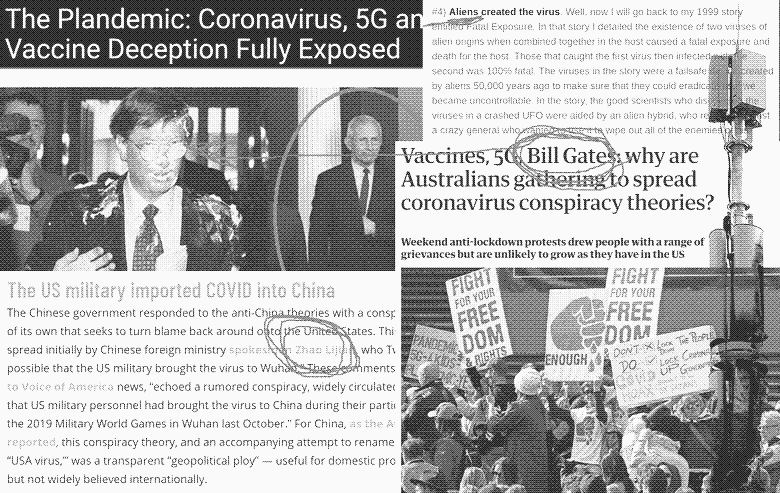Conspiracies are the New Fashion

Most People do not have a thousand friends. Maybe a good portion of the global elite do--the privileged of our generation that were raised on The Internet, and who bounce between capital cities and the global meeting grounds of Tulum and Bali and Ibiza and Oaxaca, and who run into each other at Burning Man, Summit, Ted, Davos, and Soho Houses everywhere. But for Most People, one-thousand friends is an insane number.
So if even in the very worst-hit populations, COVID-19 would kill 1 in 1000 people, it would mean that Most People will not have anyone close who has been killed by the virus. They might be stricken by the disease or might have known someone whose family member was lost to the virus, but in terms of actual downside, Most People are likely more effected by the secondary effects of the disease--by lock-downs and economic losses and the burdens of teaching their own children. And, by the inconveniences of not being able to socialize in the ways they had grown accustom.
Most People feel very little agency when it comes to doing anything about this disease; Most People are not epidemiologists. And while we have all had a crash-course in public health over the past year, there is very little that Most People can do to deeply affect the global catastrophe that is taking place. Very little it seems, except for gossip.
Gossip is how our brains developed. Gossip is how we understand ourselves, how we trust each other, and how we gain status in our groups and in a broader society. In short, gossip is a force that gives us meaning.
And this is why conspiracy theories have become the new fashion, and why our world has exploded with conspiracy theories over this past year, and especially conspiracy theories that pertain to COVID-19.
Since the first-order downside effects of this pandemic are rarely felt by an individual or their immediate friends or loved-ones, and since Most People feel very little agency to positively affect the world during this time, it makes total sense that people would find meaning and purpose in creating, spreading, and forming communities around conspiracy theories. Suddenly by reading and circulating a piece of not-widely-accepted information, the individual becomes someone with a special place of purpose. They have exclusive information that others do not have. They get to be subversive and signal difference and importance. They also naturally are able to form communities and kinship around their newly-found informational fashion, and are able to develop new theories and signal status within their new groups.
In a time where we are not seeing people in person, informational signaling can be as powerful as fashion has been for the physical world. Conspiracies are simply the new fashion--they are how we find our tribes, signal status, and make sense of the world from within our solipsistic digital simulacrums.
This is all added to the fact that we are living in a time where the truths of the world are too complicated for Most People. Complex systems and ideas need to be condensed into an epistemology simple enough that it can fit within a few simple dimensions, all of which, need to be understood and meaningful to the individual. This means that conspiracies are becoming a more vital way for people to synthesize our complex world. Conspiracies, like religion in the past, serve as functional metaphors for interfacing with forces that affect an individual's life but are outside of their understanding. And like all other choices in one's life, the decision of what metaphors to use, are heavily influenced by tribalism, aesthetics, and a desire to signal.
In the same way that I wear a leather jacket to signal my belonging to an idea, I'm spreading this idea to signal what kind of person I am and to what tribes I have allegiance.
I'm wearing this conspiracy so that you know what kind of person I am.